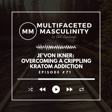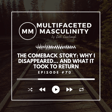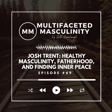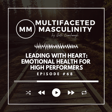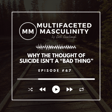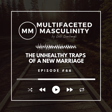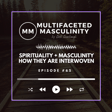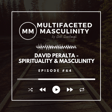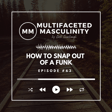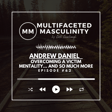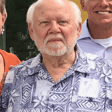Become a Creator today!Start creating today - Share your story with the world!
Start for free
00:00:00
00:00:01

Identifying Emotional Anchors - and Why They Matter | Ep. #61
Today we unpack a topic I wish I had learned about 15 years ago… all of us will experience “storms” in our lives. The question is, how can you find anchors to hold on to during the storm? Learning how to identify your anchors, then integrate them into your life will help you stay locked into your True Self when the waves of doubt, fear, overwhelm, and pain come crashing in.
In this episode you'll learn:
- Why you need to identify your personal anchors clearly.
- What is an Emotional Anchor?
- What is an Anchor Action?
- How can you pinpoint your specific anchors?... the ones that will help you the most.
- How to integrate your anchors in the most effective way to help you stay connected to your True Self.
Links
Host: Josh Cearbaugh
Website: https://joshcearbaugh.com
Instagram: https://instagram.com/joshcearbaugh
Linkedin: https://www.linkedin.com/in/joshcearbaugh/
Online Course: https://www.jumpstartyourlife.com
Transcript
Introduction to Emotional Anchors
00:00:00
Speaker
Today, we're gonna be diving into something that I wish I had found and integrated into my life 15 years ago. It wouldn't have changed everything in my life, but it sure as hell would have made it a lot smoother and helped expedite some of the dark nights of the soul that I've had to find this. And that is emotional anchors and anchor actions. And we're gonna dive into what exactly those are, why they're so important,
00:00:30
Speaker
And lastly, really how to flush them out for yourself because each one of us has unique anchors. There is no blanket, Hey, this is the catchphrase for everybody, or this is the action that is just going to work for you and for me and everybody else.
00:00:47
Speaker
Each one of us are unique. Each one of us have unique anchors, and we're going to dive into how to flush those out for yourself and integrate them in a way that helps you move through the challenging times that all of us experience and stay aligned to your true self.
00:01:05
Speaker
If you haven't already, I'd ask you to subscribe to the podcast. We've got some more fun guests coming up, as well as some topics that I'm both curious and excited to dive into in more detail with you and share. So please go ahead and subscribe. Without further ado, let's dive into these anchors and why they're so important for you to hold onto throughout your life.
Complexity of Male Stereotypes
00:01:28
Speaker
Men, we are not simple, chest-thumping, rock-smashing, fire-starting barbarians. We have depth. We intensely feel. We are scared, yet brave. We love to have fun. We're imperfect and make mistakes. We're compassionate and loving. We are multifaceted. Let's explore the reality of masculinity together.
Role of Emotional Anchors in Self-Alignment
00:01:57
Speaker
Today we're gonna talk about anchors. And no, not on a ship. I'm talking about emotional and or physical anchors. Now you might be asking what exactly is an anchor in the first place if it's not something that you drop off overboard to keep yourself stationary in the water.
00:02:16
Speaker
This is more so, it's actually something that I learned from Dave Charleston, my coach, and he was recently on the podcast just a couple episodes ago, so I would highly recommend checking his episode out because he's a wealth of knowledge. But for me, it has been something that
00:02:34
Speaker
is easy for me to turn to when I feel overwhelmed or I feel afraid or I feel burnt out or maybe even to distill it down even more. When I'm not aligned with my true self,
00:02:49
Speaker
having anchors whether they are phrases or actions that you can turn to just something super simple and we're going to get into exactly how to find an anchor as well as what the differences are and then how you can take an action on them. But having these anchors allows me to very quickly
00:03:12
Speaker
realign with my true self and gets me out of those ruts that I find myself in helps helps kind of snap me out of a funk for lack of better words.
Types of Anchors: Phrases and Actions
00:03:27
Speaker
An anchor is essentially kind of a form of self-care. It's a way to turn to yourself, to turn towards the things that are good for you deep down inside rather than checking out or rather than running and hiding or
00:03:47
Speaker
Just getting feeling buried by life. I don't know about you like I have a couple businesses running. I've got this podcast I've got consulting I've got my ranch. I've got five kids. I've got a marriage I had a lot going on and sometimes in all of that
00:04:04
Speaker
It's easy for me to get off kilter with my true self. You know, my true self that hasn't been hurt by life, that hasn't been stung or disappointed or let down. That man, that version of me isn't overwhelmed by everything I have going on.
00:04:26
Speaker
But the parts of me that if I don't take care of myself, if I don't guard my sleep, if I'm not physically active, if I choose to be silent instead of speak up in certain relationships, the list goes on and on. It's so easy to erode, let things of life just kind of erode at your true self.
00:04:47
Speaker
and get you off kilter. And so these anchors are things that realign you. They kind of snap you back into that person that you are meant to be or that you can be. Or quite frankly, this is lying sometimes dormant inside of you, waiting for you to take action on it.
00:05:08
Speaker
And sometimes that action can be these simple anchors. Now there's two, for conversation's sake, there's really two kinds of anchors or at least two kinds that I turn to. You may be aware of more and if you are, feel free to reach out and let me know. But for me, it's either a phrase or it's an action. And I'll give you some examples of my own life and things that I use as anchors for both of these. And then we'll dive into
00:05:36
Speaker
how exactly you integrate them into your life or flush them out and find them for yourself. So for me, one anchor phrase that I have, I have a few of them, but one anchor phrase I have is apostolic maverick. Now, what exactly does that mean for me? Well, apostolic, I'm not going to go into a biblical teaching of what an apostle is,
00:06:00
Speaker
But that really stems from when I was really active in church and practicing Christianity and what an apostle represented in the sense of that form of leadership, the man that an apostle would be. He is not overwhelmed by the things that he's being called to put forth or the thing that he's being called to build.
00:06:27
Speaker
And so when I think of an apostle, I think of a man who is anchored in leadership, that he has solidified his identity, that he is close to God, that he knows the steps and actions that he's taking is going towards something bigger than himself. These are just some of the examples of what that word encompasses for me.
00:06:52
Speaker
And then maverick, right? So the best definition I've heard, the difference between a maverick and a rebel, they can, their actions can look almost identical or can be identical, but the difference between a maverick and a rebel is their heart behind their actions. I had a friend of mine distill this down for me probably 10 years ago, and I broke down crying actually when he shared it with me because
00:07:21
Speaker
For a big chunk of my life, I've been labeled this rebel, right? I was the quote unquote black sheep of the family. I joined the Marine Corps. I challenged my dad when he was doing things that were less than ideal for creating a healthy environment for our family. I was the one that spoke up when other people wouldn't speak up.
00:07:43
Speaker
Now, was some of that rebellious? Yes, I would say that it was, especially in my early years because I was in a lot of pain.
00:07:52
Speaker
I didn't know how to process the pain. I didn't know how to communicate the pain. And we've all heard hurt people like to hurt people, right? So I did some really dumb shit in my youth out of a reaction of pain as well as the natural evolution of masculinity, right? There's that time in your teenage years where your prefrontal cortex isn't fully developed and you feel like you're invincible and you do dumb stuff.
00:08:17
Speaker
But from an emotional standpoint, I acted out rebelliously, but then I took that on that negative side of it on as part of my identity. And so.
00:08:29
Speaker
When I am challenging things these days in some of the things that I say or some of the things that I do, it's easy for me to mislabel myself as a rebel. I'm very much, I would say, libertarian from a political standpoint in the sense of having the government get out of my life and let me live my life. Someone could say that is rebellious. You're bucking against the system.
00:08:56
Speaker
But for me, it's being a maverick. It's the heart behind it. I want to protect my family. I want my land to be mine. I don't want to be bogged down by a lot of the systems that are in place. I want to protect my children when it comes to their schooling.
00:09:14
Speaker
All of that could be labeled as rebellious, but for me, it's really being a maverick. It's challenging the status quo to actually move things into a better direction. It's speaking up and saying things that need to be said, even if they're hard or uncomfortable to say them.
00:09:33
Speaker
And because my heart is good, that's something that one of my psychedelic journeys that I had with myself was so deeply profound. I remember laying on my bed sobbing for probably a good 45 minutes.
00:09:51
Speaker
Just saying over myself, Josh, you're a good man. Josh, you're a good man. You have a good heart. You are a good man. And for so long, I had seen myself as something negative and I still fight with having a negative lens over myself at times for sure.
00:10:10
Speaker
But this anchor phrase, apostolic maverick, keeping that in front of me, it helps me stay aligned with this image of the man that I know that I am deep down inside, essentially my true self.
Implementing Anchor Actions in Daily Life
00:10:25
Speaker
It helps me realign, just with two simple words.
00:10:29
Speaker
It helps me realign with the man that I know that I am. And so I use it. I use it at times when, you know what, I have been feeling off and I didn't get good sleep and I want to check out today and I'm not feeling like I want to be super present.
00:10:48
Speaker
But yet, taking apostolic maverick and speaking that over myself then allows me to, in a moment, go, no, no, no, no, no. That apostolic maverick is not going to run and hide. He's not going to be silent. He's not going to let certain things be okay that he knows are not okay, both within others, but also largely within myself.
00:11:15
Speaker
And so having this anchor phrase helps me realign. Now I have to keep it in front of me. And there are times when I don't keep it in front of me. And I feel the sting of that because then I lose sight of what that phrase represents for me.
00:11:34
Speaker
So that's an example of a phrase, a simple phrase. It doesn't have to be two words. It could be one word. It could be a short sentence. But the idea is to have some sort of an anchor phrase that resonates at the core of who you are to help you realign to your true self when you're feeling disjointed or disconnected from that man that you know that you can be. And then we have anchor actions.
00:12:04
Speaker
Anchor actions are practical things that you can do to do the exact same thing that can help you realign with your true self. Now with that, it may not necessarily be, I'm going to go for a 30 mile run and David Goggins it and like tell myself to suck it up and keep going. A really practical one for me is just going outside and being in nature.
00:12:34
Speaker
And the reason why that's an anchor for me, like what I like to say to people is find things that you get lost in that either refresh, refuel, or rejuvenate your soul. It's those things and it's different for everybody.
00:12:50
Speaker
For some people, being outside, all they think about is, oh my God, I'm getting bit by mosquitoes and there's funky smells and I just don't like being outside. I'd rather go to a coffee shop that has a beautiful setting and they really care about the feng shui and nothing like a good espresso. Maybe that's what it is for you, but find things and action that you can do. Now the easier, especially with these anchor actions, the easier it is for you to take action on them, the better.
00:13:20
Speaker
maybe going to a coffee shop requires you to, you know, take a shower, get dressed, load your backpack or your materials you're going to use while you're there, drive 20 minutes. And there's nothing wrong with that if you bake that into your calendar or into your schedule.
00:13:36
Speaker
But finding simple things that can refuel you, that can re-anchor you, that are simple and quick, that's the key, right? Whether it's a short phrase or a simple quick action. So on our ranch, we've got about 50 chickens at varying ages from a couple of weeks old to a couple of years old.
00:13:58
Speaker
And so for me, it has now become part of my morning routine. I go tend to the chickens first thing. I mean, from a neurological standpoint, getting outside, getting vitamin D, getting fresh air, you know, all of that is beneficial. But for my soul, for me being connected to my true self, being outside, being around my chickens, seeing the greenery all around me,
00:14:24
Speaker
getting their water is something as simple as getting their water or getting their food or tending to my garden. It doesn't mean that I'm taking three hours and losing the morning, just kind of essentially escaping from responsibility. What it is, is it's an action that helps me stay aligned to that stronger sense and essence of who I am because I have these things that refill and refuel me. So this morning,
00:14:53
Speaker
I went outside, I took care of my chickens, I got water from our rain capture system and watered the garden, and then I went for a 30 minute walk. And now, literally just got done with all of that, and now I'm sitting down recording this episode.
00:15:12
Speaker
Now, could I have recorded this episode after staying up super late, waking up early, getting the kids to school and forcing myself to sit down, pound three cups of coffee and do it? Yes, I totally could.
00:15:27
Speaker
But now, as I'm speaking right now, I feel at the core of who I am, I'm speaking from an abundance or an overflow of feeling that refreshed and that refueled and that rejuvenated sense of who I am. Obviously, from a practical standpoint, going for a walk, there's more blood flow going to my brain. I'm not dismissing the really practical components of this.
00:15:52
Speaker
But what I've learned is if I've been around people, they literally wake up, get a cup of coffee, open their laptop, start doing their emails. And that works for them. Finding your state of flow and when you're most productive, all that is important.
00:16:08
Speaker
But for me, if I do that, and I do it at times when I have to, but if it's part of my routine to do that, I'm actually not anchoring in the things that refuel me or give me life first.
00:16:24
Speaker
And so then I'm playing catch up or it's really easy. I'm sure we've all done it, right? You open your emails, you reply to some emails, you start putting out some fires. And before you know it, it's lunchtime and you haven't really looked up from your computer. And then the afternoon you drink an energy drink or get a coffee to push you through the rest of the day. And then you're.
00:16:43
Speaker
semi-miserable and then you do that enough days in a row and you look up and look around and really aren't enjoying your life. So a non-negotiable for me is incorporating something simple first thing in the morning that gives me life. That may be waking up earlier and having quiet time and journaling. That might be, like I said, going to a coffee shop and making sure that you're doing that a few times a week. That might be
00:17:10
Speaker
finding a hobby and stitching something or it doesn't matter what it is. What is it for you? And sometimes you need to actually go back because I've had this with a lot of clients, right? I asked them, well, what is it you do that when you're doing it, a lot of times you lose track of time, right? You're just kind of lost in it.
00:17:30
Speaker
And even if you don't lose track of time, you feel refreshed, refueled or rejuvenated after doing it. And a lot of times you get lost because you're hyper focused on that activity because you're enjoying it so much. And I've had clients go, well, I don't really have any hobbies. I don't know anymore.
00:17:51
Speaker
So we do an exercise where you actually dig into your childhood. So, so what was it when you were a kid that you felt refreshed, refueled, rejuvenated, or maybe you got really excited when you did it and it was a highlight.
00:18:05
Speaker
And then you take those, whatever those are, and you look for themes within that. So for me, as an example, when I was a kid, man, I loved riding my bike in the neighborhood with my friends. Like it was just, it was freedom, the wind in my face. It just, I loved riding my bike, but really what that was, I, I'm not going to sell my truck and then go buy a bike and start riding my bike everywhere.
00:18:33
Speaker
But what that was and what I'm looking for within themes is I was outside. I was in nature. Yes, I was riding in my neighborhood, but then you dig deeper and you try to find 10, 15 things that made you feel refueled in your childhood before life got in the way, per se, or before you had your kids and then you had to take care of them instead of yourself. What were some of those themes?
00:19:00
Speaker
You know, I loved swimming, going to the neighborhood pool. I loved riding my bike. I loved tinkering with my bike and building things with my hands. I loved being outdoors. And so for me, the big takeaway from that was, okay, I need to be outside.
00:19:16
Speaker
I need to be outside, even if it's just for a little bit of time, to be able to refuel and find that sense of life within me so that when I'm sitting down at my laptop and I'm doing my emails or if I'm meeting with a client,
00:19:33
Speaker
I'm doing it out of an overflow rather than doing it propped up on a bunch of stuff that's helping me drag through life but yet be miserable at the core of who I am. Because when I'm there, it's really easy for me to get looped into a negative spiral. It's really easy for me to get caught up in self-doubt. It's easy for me to feel overwhelmed. It's easy for me to feel lost within what I'm doing and just kind of want to escape, right? Then it's that much easier for me to go, you know what?
00:20:02
Speaker
I heard there's a great documentary on Netflix. I know that it's one o'clock in the afternoon and I've got a lot going on, but I'm going to mosey on over the TV and pull up that Netflix.
00:20:11
Speaker
It's much easier to do that when I haven't anchored and I haven't kept that phrase in front of me, when I haven't taken the time to do the actions that I know that refuel me. Is Netflix still on my TV? Could I still check out right now? Absolutely. But it's just not as attractive. It's the same premise of if you stop eating junk food and start eating healthy over time, more and more of the junk food is less and less attractive. Doesn't mean you don't crave a good burger every now and then.
00:20:41
Speaker
But it's hard at first when you are consistently eating the junk food to let that go because it's given you a false sense of comfort. But over time, doing the things that eating the things that are better for you.
00:20:56
Speaker
It's just not that it comes at a cost right now for me. Biteable ice cream. I know I'm going to regret it in the morning for a variety of reasons, which we don't need to get into, but are probably obvious. Dairy doesn't sit well with me. So now I weigh that, right?
00:21:11
Speaker
The same is true with the things that I do that give me life, the nutrients, using the food analogy, or prop me up for a temporary period of time to push me through something, but ultimately suck the life out of me or get me misaligned with my true self.
Creating Personal Anchor Phrases
00:21:34
Speaker
So the question is, how do you integrate these into your life? You're kind of like, okay, great, Josh, you've got your anchors. Good for you. That's awesome. Maybe there's some benefit from it, but really practically, how do you take this concept and find them for yourself? Well, there's a couple of things you can do.
00:21:56
Speaker
we'll start with the anchor action because I've already alluded to it, where sit down and both of these kind of beginning stages, you have to actually sit down and spend some intentional time flushing this stuff out. I now have it baked into my morning routine, some of the things that I do, or I have this phrase and it's almost become a default in the sense of I don't have to think about it much, I just kind of do it.
00:22:22
Speaker
But in the beginning, I had to spend some time being really honest with myself and intentional with myself to flush out what are these things for me specifically. So with the anchor action, it's to pull up in your journal, your computer, whatever it may be, and really spend some time thinking about
00:22:46
Speaker
What were things, either right now, as an adult in your life, wherever you are, what are some things that I feel refreshed, refueled, or rejuvenated doing? And if you can't think of any, if you're like, you know what, I have got a six month old, a year and a half old, a four year old, and a seven year old, and I haven't done anything for myself for the last 10 years. That could be a very real possibility of where you're at right now.
00:23:13
Speaker
And that's okay. That's okay. There's, there's a time for everything and young kids, they consume a lot of your attention. And as a good parent who chooses to be present, you do kind of take a back seat, but you need to begin to integrate some of the things that put you back into the driver's seat. Otherwise, as a teenager, you're going to have teenagers that feel really disconnected from you because you haven't modeled how to take care of yourself.
00:23:39
Speaker
So if you find yourself there or wherever you may be caught up in your career and you just don't take care of yourself, sit down and think about what are things that I've done in my past. It could have been when I was in college, when I was in high school, when I was five, I'd go over to my grandma's house and we would pick flowers every afternoon. And gosh, that was just the highlight of my time at grandma's house.
00:24:04
Speaker
or we would go out to the lake and go swimming. What was it in your past? Start with your present if you have things great, but then sift back. Take some time to look back on your life and write out what are some of those things that you really loved, that you looked forward to, that you were surprised by how much you enjoyed it. And then once you have those flushed out,
00:24:32
Speaker
Like I already said, look for themes in that. Is it, were you in nature? Were you around people? Was connecting with people part of it? Was it not connecting with people? Were you like, ah, I need that time alone or else it's not good? Was it working with your hands? Was it problem solving with your mind? What was it for you? What were some of those themes?
00:25:00
Speaker
And then once you have the themes, then take some time and begin to think about, okay, falling in line with the themes given where my life is right now.
00:25:10
Speaker
Maybe I can't go swimming at the lake every weekend even though I love it, but what can I do? Can I go get a gym membership with a pool? Can I take long showers when I'm feeling overwhelmed? Can I take a cold plunge and knock myself out of my funk? So if water is a piece of it, then how do you integrate water into an action item that you can visit on a regular and consistent basis
00:25:38
Speaker
because doing that is gonna help you stay aligned to your true self. So flush out what those actions were, those experiences were, look for themes, and then identify how can you pull something or what's available to you now that fits within that theme that then you can start to do on a regular basis.
00:26:00
Speaker
And when I say a regular basis, doesn't mean it has to be every day. You could start with once a week. You know what? Once a week, I need to get out and I need to go for a walk no matter what. It's a non-negotiable. Or for me, super practically, I need to feed my chickens or else I don't get eggs and they die. So I have an incentive there, but it's also life-giving for me. So based on those themes, practically speaking, where you are today, what are some things that you can do to help you stay refreshed and refueled?
00:26:31
Speaker
because doing that is gonna help you stay, help the unattractive things be less attractive. And then you will operate out of an overflow because you've taken time to fill yourself up with these things. And then with the phrase, this one, this finding an anchor phrase can almost be harder and can bring up more insecurities and challenges if you let it. It could also be easy,
00:27:02
Speaker
With a lot of people I've worked with, this is really hard, what I'm about to tell you. It's doable. Everybody can do it, but it's uncomfortable a bit. So start by seeing if you can write a list of 50 things that you love about yourself. Now, a couple of caveats to this that make it even harder. That list of 50 things cannot be based on what you do and has to be based on who you are.
00:27:32
Speaker
Now let me give you an example of that. Let's say that when I have friends that need to move, I just show up. I'm always there to help my friends move. And you could say, you know what, I love that when my friends need somebody to help them move, I'm always there. Now the problem is if you remove, if none of your friends ever move again, you don't have that thing that you can say that you love about yourself that you can hold onto.
00:28:02
Speaker
Instead it is, I love that I'm a loyal friend. That I show up no matter what. That I'm willing, I love that I'm willing to be inconvenienced on behalf of those that I love. Whatever it may be, however you want to communicate that, right? And you may find yourself running into a dead end after five or 10. That's actually not that uncommon. You might blow through this and have 50 and it's no sweat and you've done a lot of work identifying the things you love about yourself. Awesome. That streamlines this.
00:28:32
Speaker
But if you happen to be somebody who can't get to the 50, then start to branch out. Cause cause here's what you're going to flush out and find is there may be things that currently you don't love about yourself. Cause those things are all things that are actually your true identity, but you may have, you may only have a list of 14. Well then begin to think about and branch out. What have you heard? Even if you don't feel connected to it, doesn't even feel true to you.
00:29:02
Speaker
But what are themes or things or phrases that you've heard from people that love you, from family, from friends, from coworkers, that they have said they see in you?
00:29:16
Speaker
could be, oh man, you're just such a great networker. And maybe you may be thinking, yeah, but I deal with social anxiety. And so I put on a good front and, uh, I can carry a conversation, but the whole time I'm anxious. And so I don't really love that about myself. You see how there, there can be a little bit of distortion there, but don't don't, if you can't think of the list for yourself, then begin to branch out and think of what have other people said about you or to you that really stand out.
00:29:47
Speaker
And then work on that list. And then if you want to get even more uncomfortable, which you actually might be supply pleasantly surprised by this part of the exercise is if you can't get to that 50, then literally go to those people, go to those people with your list, with your list of 17, 23, 42, whatever it is.
00:30:11
Speaker
and go, Hey, John, uh, listen to this podcast, multifaceted masculinity. Josh gave me this homework. I figured I'd give it a shot. I can't even think of 50 things I love about myself. I don't even connect to half of these things I put on my list, but these are some of the things that other people, you know, I feel like maybe they've, they've seen in me. Can you read this list and see if there's anything that I'm missing?
00:30:37
Speaker
and actually let them engage with helping you identify your truest self, your strengths, the things that make you unique. You stand out from anybody else. It's going to do several things. One, it's going to be really uncomfortable, but two, you're going to feel a lot closer to that person because they're going to help you find your true self. They're going to help you flush that out.
00:31:04
Speaker
And we all know that we need connection probably more so now than in years. We've learned how to be isolated and be strong and be independent. We also need to learn how to be open to receiving love and edification and adoration from those who know us best. Now, once you have that 50, okay, you got that 50 things and maybe you can only get to 30 and you're like, this is all I could do. Okay. Then begin to look through that list.
00:31:36
Speaker
and identify what, if I can encapsulate this list into two or three sentences, right? Two or three sentences, write out that little phrase of this is who I am. And then once you've written out those two or three sentences, spend some time with it.
00:32:01
Speaker
take those two or three sentences and go, okay, now what is a phrase, either a word or a phrase that encapsulates this? And again, for me, it was apostolic maverick, apostolic there, there's, it's multifaceted pun intended, right? The podcast, but there's, there's so much within apostolic maverick for me that I literally only touched on the super high levels of it.
00:32:32
Speaker
but those two words together encompass this list for me, encompass the phrase for me. It encompasses so much more than just those two words and helps me realign with that list, realign with my true self.
Making Anchors Non-Negotiable
00:32:54
Speaker
Now, once you've done all that, and I just threw a whole lot of homework at you,
00:32:59
Speaker
If you're willing to do that, here's what's going to happen. One, you're probably going to get, have some uncomfortable conversations either with yourself or with people that know you because you're going to be vulnerable.
00:33:13
Speaker
And sometimes being vulnerable with yourself is harder than being vulnerable with other people because then it requires taking extreme responsibility for where you're currently at. And I'm not saying extreme responsibility in the sense of I need to go work out more. I'm saying extreme responsibility in the fact that maybe I don't love myself as much as I perceive or that I give off to other people and I've got some work to do here. But once you've taken time to flush out that phrase,
00:33:43
Speaker
Then put it in front of you, put it in front of you on a regular basis, whether that's setting a reminder on your phone, putting it with a marker on your mirror every morning while you're brushing your teeth, having it emailed to you on repeat. It doesn't matter how you do it. Just get that phrase in front of you on a regular basis. If you need it five times a day, then do it.
00:34:14
Speaker
Nobody's going to care more about anchoring you in your true self than you will. So what is it you need to have that in front of you so that you can realign and re-anchor within your true self? Then with the action, figure out how to get that thing on your calendar, especially these days, right? If it's not on the calendar, it's probably not going to happen.
00:34:42
Speaker
Is it once a week? Is it once a day? Is it two times a week? Is it three times a week? What is it when you find that anchor action that refuels, refreshes, rejuvenates you that you can get lost in that you, you get done and you feel ready to go.
00:35:01
Speaker
Get that into your calendar until it becomes part of your routine. See, I don't have feed the chickens every morning in my calendar. I just know that's what I do. I get up, I drink some salt water, I sometimes have coffee, sometimes I don't after I sit down and journal. And then first thing I do, the sun's up, I go out to the chickens. I go water the garden.
00:35:28
Speaker
I don't do it every single day in the same timeline at the same time, but I do it so that I start my day off on the back end of doing something that helps me feel refreshed and feel connected to myself, to God, to nature, to my land, right? So put it in your calendar. And then lastly, you need to make this non-negotiable.
00:35:59
Speaker
Now what does non-negotiable mean? It means that you could, let's just say that it's watering the garden. That's what it is for me, right? I don't care if I didn't sleep good the night before. I don't care if I'm having a fight with my wife. I don't care if the kids are pissing me off. I don't care if the business isn't doing well. I don't care if I got a file, like I don't care what's going on in my life. I'm going to go water the fricking garden and feed the chickens first thing in the morning.
00:36:28
Speaker
I don't care what's going on, I'm going to put apostolic maverick in front of me on a regular basis. I'm going to sit down in front of my phone, set up a reminder, set it for repeat. I'm going to keep these things in front of me. Everything else can be going on.
00:36:47
Speaker
but I have a non-negotiable action and I have a non-negotiable phrase that helps me stay anchored when the storms of life come crashing in and they will, or they are right now for you. You need these anchors to help you guide through the storm metaphorically.
00:37:06
Speaker
And when you do that, you're going to find it easier to stay aligned to the man that you know that you can be. And lastly, I would say that be willing to give yourself grace if you screw it up.
00:37:23
Speaker
Because even though I'm breaking all this down today and yes, I fight for it. And yes, it is part of my reality. I still get in funks. I still forget to do these things at times. And when I do, I feel it. I feel the cost of it. Kind of like eating the ice cream the night before, right? The next day I feel that cost.
00:37:48
Speaker
And so more and more, when I feel the sting of the cost of not being aligned with my anchors, the more I feel motivated to stay anchored in the things that keep me connected to my true self and keep me aligned with the man that I know that I can be.
Conclusion: Benefits of Positive Anchoring
00:38:05
Speaker
And when you choose,
00:38:07
Speaker
to anchor yourself in the things that give you life, to anchor yourself in phrases that realign you. It's going to help you move through those moments that we all experience when it's so much easier to run and hide, to check out, to not be the man that we know that we can be. Anchor yourself in these things and find yourself
00:38:34
Speaker
being more connected to the man that resides inside each and every one of us, just waiting to be seen by our loved ones, by the people in our life, and by ourself.
